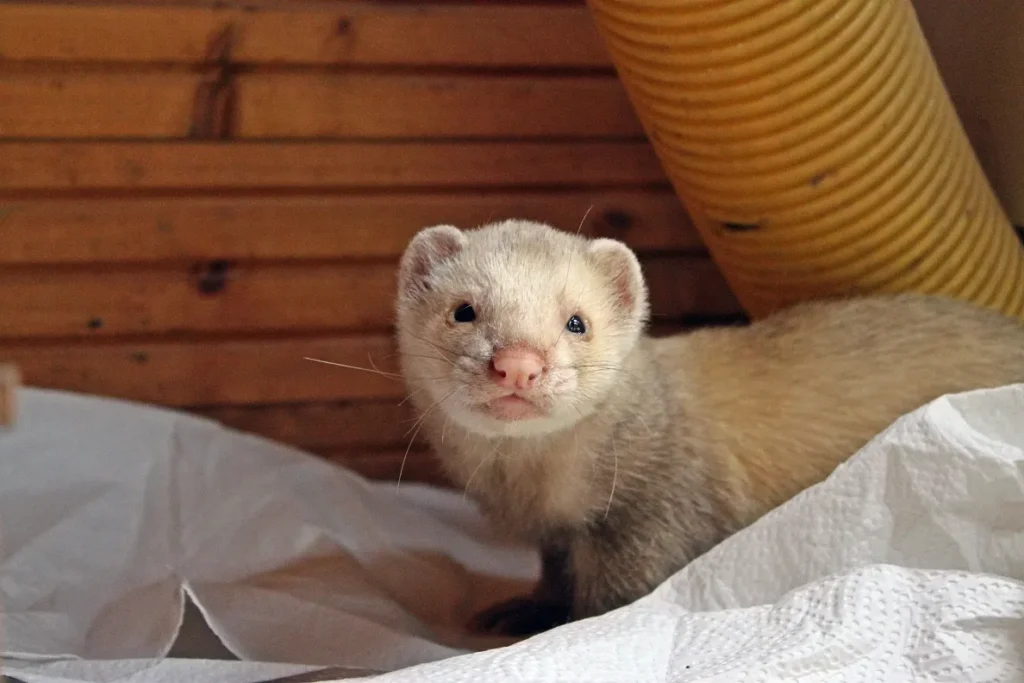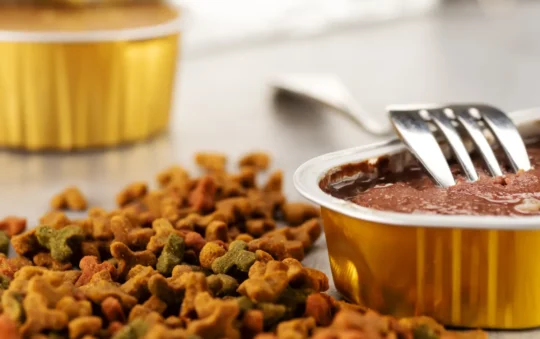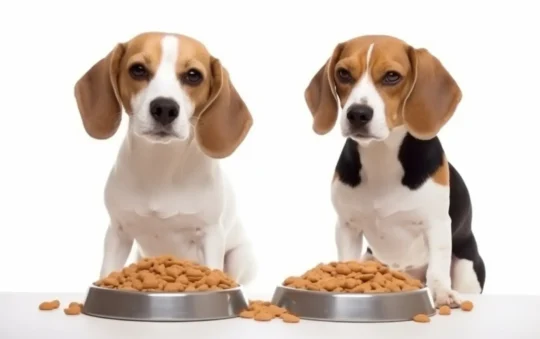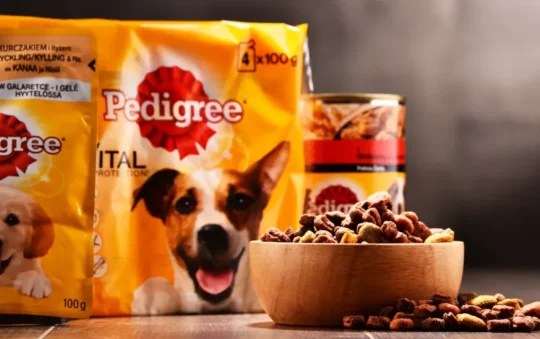Last updated on March 3rd, 2024 at 01:31 pm
As someone who owns a ferret, I know how important it is to give them the right kind of food to keep them healthy and happy. One common question that comes up is whether ferrets can eat dog food. The answer to this question is a bit complex, as ferrets technically can eat dog food occasionally with little or no issues; however, normal commercial dog food does not provide adequate nutrition for ferrets if fed exclusively.
Ferrets are obligate carnivores with specific nutritional needs, meaning that they require a high-protein, low-carbohydrate diet primarily composed of animal-based proteins. Dog food, on the other hand, is formulated for dogs that are more omnivorous and often contain an unsuitable amount of grain; this is not only unsuitable for ferrets but could lead to health issues if fed regularly.
Key Takeaways
- Ferrets require a high protein, low carbohydrate diet primarily composed of animal-based proteins
- Dog food does not provide adequate nutrition for ferrets and often contains unsuitable ingredients
- Seek ferret-specific food for proper nutrition, avoiding dog food as their primary source of sustenance
Ferret Basics
As a ferret owner, I have learned that understanding their basic needs and biology is crucial when it comes to feeding and caring for them. Ferrets are obligate carnivores, which means they require a diet high in animal protein to thrive. The structure of their teeth and mouth has evolved to primarily consume and break down animal tissues.
Since ferrets are carnivorous animals, their diet should consist mainly of meat-based proteins and fibre. Their small and sharp teeth are designed for tearing into flesh, and their digestive systems lack the necessary enzymes to efficiently break down complex carbohydrates or other non-animal food sources. Giving a ferret plant-based or carbohydrate-heavy kibbles can lead to health problems in the long run.
In contrast to other pets like dogs or cats, ferrets have a high metabolic rate, so they require a diet that is not only high in plant proteins but also in fat. Their fast metabolism allows them to efficiently convert the calories from their kibbles into energy and maintain their playful and energetic nature.
When considering what to feed my ferret, I have encountered questions about whether ferrets can eat dog food. Although ferrets can technically eat dog food occasionally, it is not recommended as a regular dietary choice. Dog food often contains carbohydrates and lower-quality proteins, which are not suitable for ferrets’ unique nutritional needs. In addition, ferrets require more taurine – an amino acid found in meat – than dogs do, which plays a crucial role in maintaining proper heart and eye function. This is another reason why dog food may not provide the best nutrition for a ferret.
With the right diet and care, ferrets can be happy and healthy companions. It’s essential to stay informed about their specific nutritional needs and provide them with the appropriate dog foods to support their well-being.

Nutritional Needs of Ferrets
Protein Requirements
As a ferret owner, I’ve learned that ferrets are obligate carnivores with a high metabolic rate, requiring a substantial amount of protein in their diet. Their protein intake should ideally be between 30 to 40 percent of their overall diet, consisting of high-quality, animal-based protein sources. Plant-based proteins aren’t suitable for ferrets as they lack essential nutrients such as taurine and vitamin B12, which are crucial for their metabolic processes and overall health.
Fat Requirements
Another important aspect of my ferret’s diet is fat, which provides them with the much-needed energy to stay active and healthy. The fat content in their food should be at least 15-20 percent, with an increase of up to 30 percent during growth or pregnancy. Animal-based fats are preferable as they provide essential fatty acids that support coat health and overall well-being.
Fiber and Carbohydrates
While ferrets can easily derive their energy from proteins and fats, their digestive systems aren’t adapted to process fiber and carbohydrates effectively. Because of this, my ferret’s diet should contain less than 3 percent fiber and minimal carbohydrates. Excessive carbohydrates can lead to an upset stomach and create long-term health problems.
In summary, as a ferret owner, it’s my responsibility to ensure my pet gets the proper nutrition, including a diet high in protein from kibble and wet dog food, an adequate amount of fat, and minimal fiber and carbohydrates.
Why Dog Food Can Be Problematic for Ferrets
Composition Differences
As a ferret owner, I need to be aware of the differences in composition between dog food and the ideal diet for my ferret. Dog food typically contains a mix of protein, fat, fruits, vegetables, and grains, which might seem nutritious for most animals, but not for ferrets. Ferrets are strict carnivores, requiring a high-protein and high-fat diet. The presence of fruits, vegetables, and grains in dog food can affect my ferret’s digestive system, as their short digestive tracts are not designed to process such ingredients.
Specific Nutrients Concerns
Having a closer look at the nutritional content of dog food, I recognize that it doesn’t meet my ferret’s dietary needs. Ferrets require a higher protein content than what dog food typically offers. Moreover, the fat content in dog food may be too low for my ferret. When it comes to vitamins and minerals, dog food doesn’t provide the specific ones my ferret needs. For example, ferrets may develop a deficiency in their vitamin D and calcium levels when fed dog food, as it doesn’t contain enough of these essential nutrients.
Potential Health Problems
Feeding my ferret dog food can lead to various health problems, including heart disease due to nutritional imbalances from lack of meat protein. Additionally, the inability of ferrets to digest fruits, vegetables, and grains found in dog food may result in serious digestive problems. These undigested components can cause blockages in my ferret’s digestive tract, leading to potentially life-threatening situations.
In conclusion, while dog food might be a convenient option in a household with multiple pets, it’s essential for me to provide my ferret with a species-appropriate diet rich in meat protein to ensure their overall health and well-being.
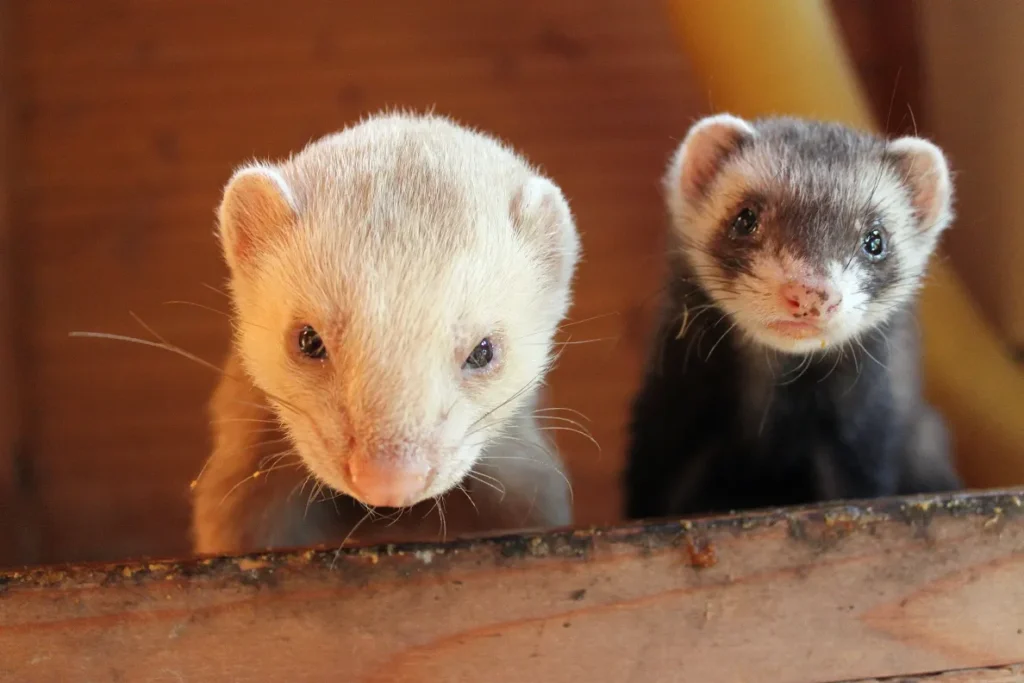
Alternatives to Dog Food for Ferrets
As a ferret owner, it’s essential to find a proper diet for your pet, since dog food isn’t the ideal choice due to their unique nutritional needs. In this section, I’ll discuss three reliable alternatives: Commercial Ferret Food, High-Quality Cat Food, and Raw Meat Diet.
Commercial Ferret Food
Commercial ferret food is specifically designed to meet the ferrets’ nutritional requirements. These products are high in animal proteins and fats which are essential for ferrets’ health. When selecting commercial ferret food, I always look for those that have at least 35% protein and 20% fat content. Dry food is one of the most common options available, and it keeps well, making it convenient to store.
High-Quality Cat Food
If commercial ferret food is not readily available, high-quality cat food can be a suitable alternative. Ferrets and cats share similar nutritional needs, so I opt for high-protein kitten food over adult cat food, as it contains more animal proteins. I also make sure to check if the cat food contains essential nutrients such as taurine, as it helps keep my ferret healthy.
Raw Meat Diet
Providing your ferret with a raw meat diet allows them to consume natural sources of animal proteins. Some options for a raw meat diet include:
- Mice: This can be an ideal choice because they are nutritionally complete prey for ferrets and help promote natural hunting behaviors.
- Poultry: Chicken and turkey can be offered as part of their diet, but it’s essential to ensure they are bone-in and unprocessed.
- Organ meats: Liver, heart, and kidney from various sources like chicken, beef, or lamb can be provided in moderation.
When feeding a raw meat diet, it’s crucial to handle the food safely to avoid bacterial contamination and ensure my ferret receives a balanced diet.
Foods to Avoid for Ferrets
As a ferret owner, it’s crucial that I provide a healthy diet to my pet to ensure their well-being. There are certain foods that ferrets should never consume. I’ve compiled a list of foods that one should avoid feeding ferrets in order to maintain their health.
Firstly, chocolate is a big no for ferrets, as it contains theobromine, which can be toxic to them. Similarly, avoid feeding your ferret cooked meat as it can be difficult for them to digest.
Next, it’s essential to know that ferrets should not eat fish or organs. Although they’re obligate carnivores, these foods can disrupt their nutritional balance, leading to poor health. Additionally, I avoid giving my ferret pork, as it’s high in fat and may cause health issues.
Ferrets also have trouble digesting plant-based foods, so it’s best not to feed them peas or any products containing wheat. These can cause gastrointestinal problems and malnutrition.
When it comes to treats, I’ve learned that cat treats and dog treats are not suitable for ferrets. These treats often contain ingredients that are difficult for ferrets to digest and may lead to health complications. It’s better to opt for treats specifically designed for ferrets or provide them with small pieces of raw meat.
Lastly, a ferret’s diet should be devoid of rabbit meat, as it’s too lean and may not provide the necessary nutrients required for optimal health.
Overall, understanding the types of foods to avoid for ferrets is crucial in providing a well-rounded diet that promotes a healthy, happy, and active life for our furry friends.
Tips for Feeding Ferrets
When it comes to feeding ferrets, it’s crucial to meet their dietary needs, ensuring their overall health. I’ve gathered some useful tips to help you provide a balanced diet for your ferret.
Ferrets are carnivorous animals, which means their diet should primarily consist of animal-based proteins. My top choices for protein sources are chicken, turkey, lamb, duck, and salmon. It’s essential to avoid plant-based food, as ferrets don’t have the necessary enzymes to digest them properly. I also like to include eggs as a protein source from time to time.
In addition to proteins, ferrets require a high-fat diet for energy. Aim for 10-15% fat for adult ferrets, and up to 30% for growing or pregnant ones. Wild ferrets usually snack on the whole prey, which provides them with the proper balance of nutrients; however, for our pet ferrets, I recommend high-quality, commercial diets designed specifically for them. Although some may suggest using cat food, ferret-specific diets are highly recommended to meet their nutritional needs like this one.
Be mindful of potential gastrointestinal issues and malnutrition that result from improper dignitaries. Offering a variety of foods, such as mixtures of premium ferret kibble, fresh meat, and occasional treats, promotes healthy digestion and averts dietary deficiencies.
Remember to consult with your vet before making any significant changes to your ferret’s diet. They can assess your ferret’s health and provide personalized recommendations based on their specific needs. By following these feeding tips, we can make sure our ferrets enjoy a healthy and balanced diet, preventing malnutrition and ensuring a happy life for our furry friends.
Frequently Asked Questions
As a ferret owner, I’ve learned that dog food is not an ideal choice for ferrets. Although they can technically eat it with little or no issues occasionally, it isn’t the healthiest option for them. Ferrets require a diet high in protein and fat that dog food may not provide sufficiently for their needs1.
From my experience, I’ve found that the primary difference between dog food and ferret food is the nutritional composition. Ferret food is designed specifically to meet a ferret’s unique nutritional requirements, which include high protein and fat content, and low in carbohydrates2. Dog food, on the other hand, may contain more carbohydrates and fewer proteins, fats, and essential nutrients for ferrets3.
As an owner who’s conscious about my ferret’s health, I avoid feeding them dog food containing high levels of carbohydrates, low-quality proteins, fillers, or artificial preservatives4. Ferrets have shorter digestive systems, making it difficult for them to process these ingredients, so it’s best to avoid such foods.
It’s advisable not to mix dog food with ferret food on a regular basis. While dog food may be used as an occasional treat, it’s essential to stick to a high-quality ferret diet to ensure their long-term health5.
In my experience, I’ve found that feeding my ferret a balanced diet of high-quality, high-protein ferret food is the best option for their health. Alternatively, raw or cooked meat pieces can be incorporated into their diet, including chicken, turkey, or rabbit6. However, it’s crucial to consult a veterinarian to ensure the ferret’s needs are met with such alternatives.
Yes, there are potential health risks associated with a ferret consuming dog food. Since dog food may not provide the high protein and fat content that ferrets require, consistently feeding them dog food can lead to nutritional deficiencies7. Additionally, the presence of high carbohydrates, fillers, and artificial preservatives in dog food can potentially harm a ferret’s health.
Footnotes
- https://petkeen.com/can-ferrets-eat-dog-food/ ↩
- https://mypetferret.com/ferret-food-chart/ ↩
- https://pocketpets101.com/can-ferrets-eat-dog-food/ ↩
- https://dogfoodstuff.com/can-ferrets-eat-dog-food-the-truth/ ↩
- https://petfoodfuss.com/ferrets/can-ferrets-eat-dog-food/ ↩
- https://mypetferret.com/ferret-food-chart/ ↩
- https://pocketpets101.com/can-ferrets-eat-dog-food/ ↩


